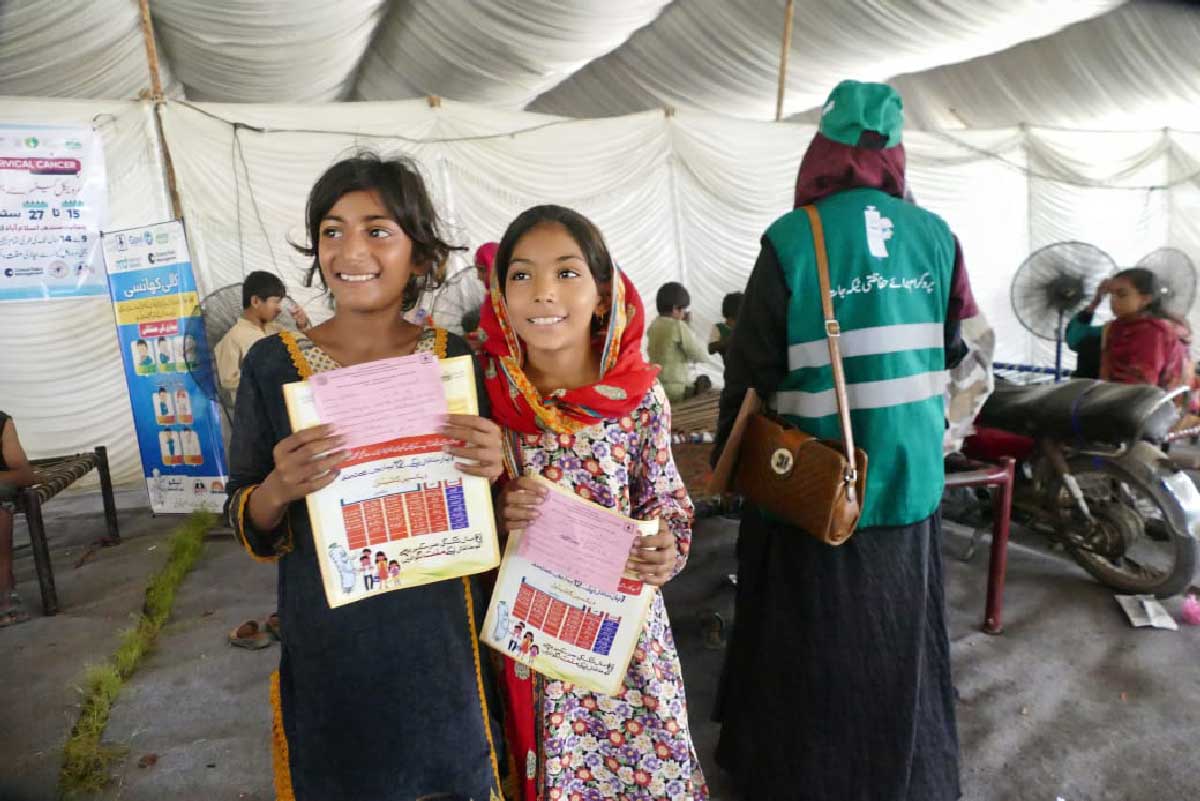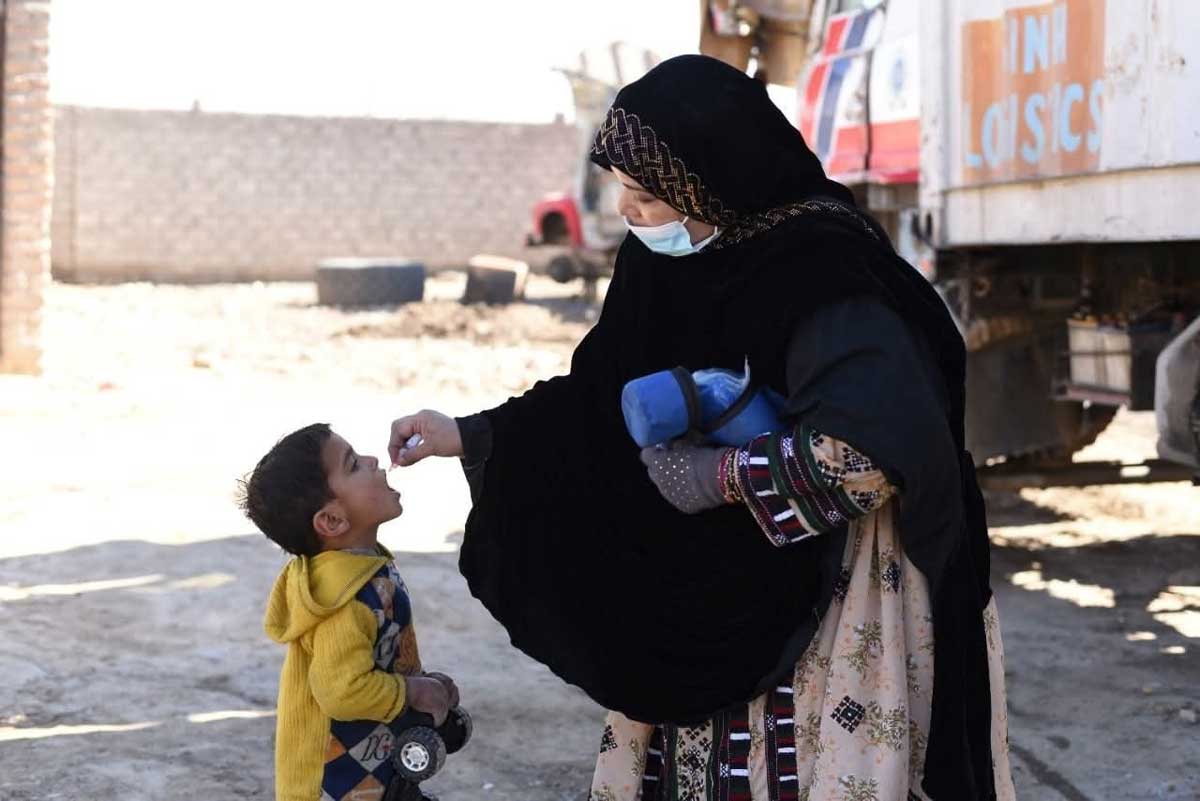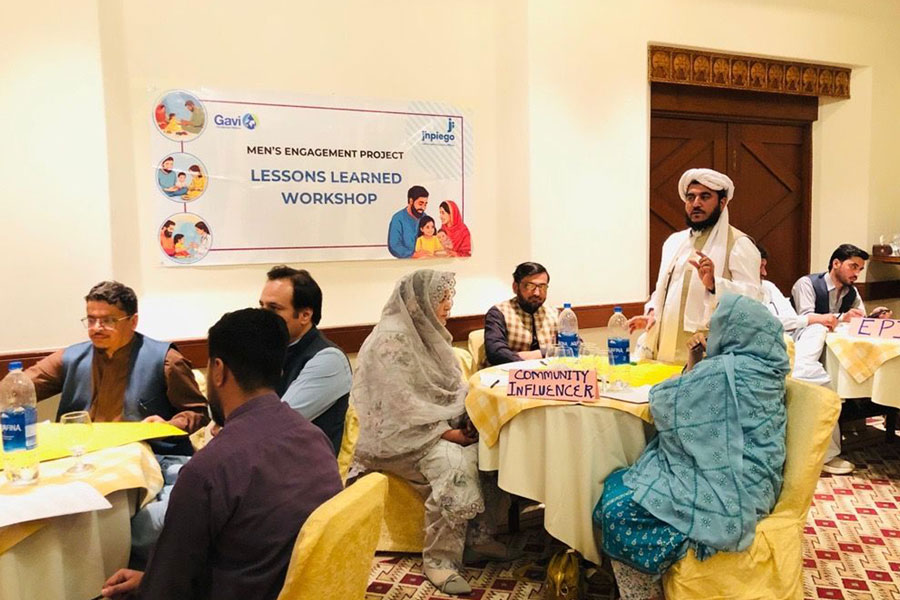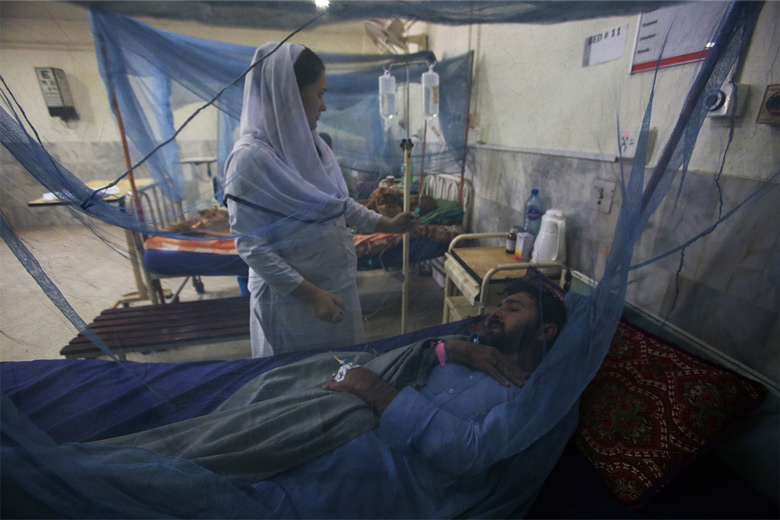Amid dangerously hot weather, Pakistan’s vaccine cold chain stays strong
Rising summer temperatures are causing hospitalisations, deaths and power shortages in Pakistan. But a robust vaccine cold chain is helping keep children safe.
- 8 August 2024
- 7 min read
- by Adeel Saeed
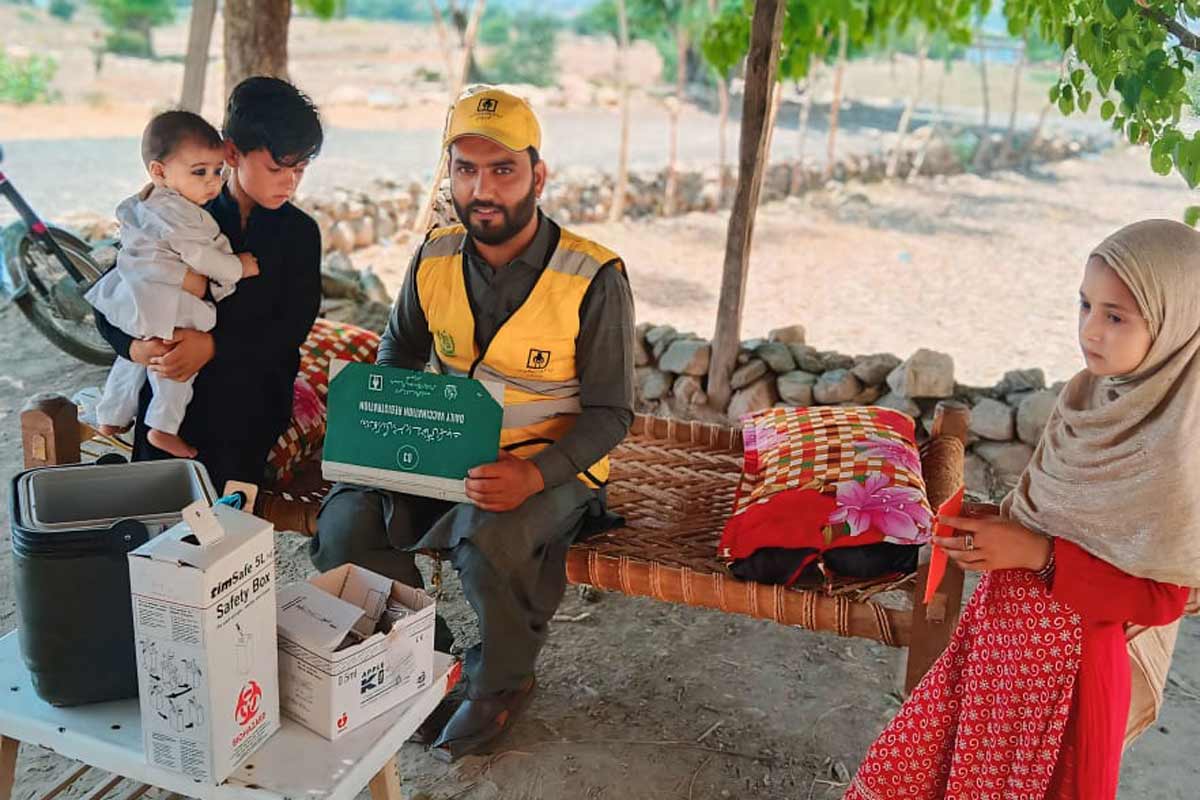
Even on the most sweltering summer days in Chamar Kand, part of Mohmand district in Pakistan’s Khyber Pakhtunkhwa, vaccinator Abdul Rahim Safi is trudging across rocky hill terrain. “Scorching heat coupled with prolonged electricity supply cuts for more than 20 hours a day makes duty performance very challenging, besides threatening efficacy of vaccines,” he acknowledges – most vaccines require a constant, chilly temperature of between two and eight degrees Celsius. “But the strong and effective cold chain system maintained by Expanded Programme for Immunization (EPI) keeps the drugs safe and potent .”
Cool it
All over the world, and not just in Pakistan, it’s a collaboration between specialised technologies and human endeavour that insulates vaccine doses against hotter and hotter summer temperatures.
Here on the Mohmand branch of the global vaccine cold chain, a solar-powered ice-lined refrigerator (ILR) is the indispensable cooling engine. Solar power affords the health facility the chance to operate independently of the electrical grid, which, in this remote part of the country, is subject to frequent blackouts.
“None of the children from my target of 2,100 children in this remote Chamar Kand mountainous region [...] miss any dose due to prevailing blazing summer.”
- Abdul Rahim Safi, vaccinator
But even harnessing the burning sun isn’t enough of a guarantee, given that technical hitches can still cause fridges to go dark. Ice-lined refrigerators are special. As the name suggests, they are girdled with an ice buffer that means the fridge can stay cold for hours even without a power source, and even when temperatures outside hit a sultry 40°C.
“Apart from electrical equipment, [we have] the standard carrier box wherein vaccines are carried for several hours in blistering sun to reach out to communities living far apart. The vials remain safe and effective for the protection of children,” Rahim told VaccinesWork. Vaccine cool-boxes can keep vaccines cool for as long as 14 to 16 hours, he explained.
“None of the children from my target of 2,100 children in this remote Chamar Kand mountainous region, located in very close proximity of Afghanistan border, miss any dose due to prevailing blazing summer, and are getting the doses in every nationwide immunisation campaign,” Rahim declares proudly.
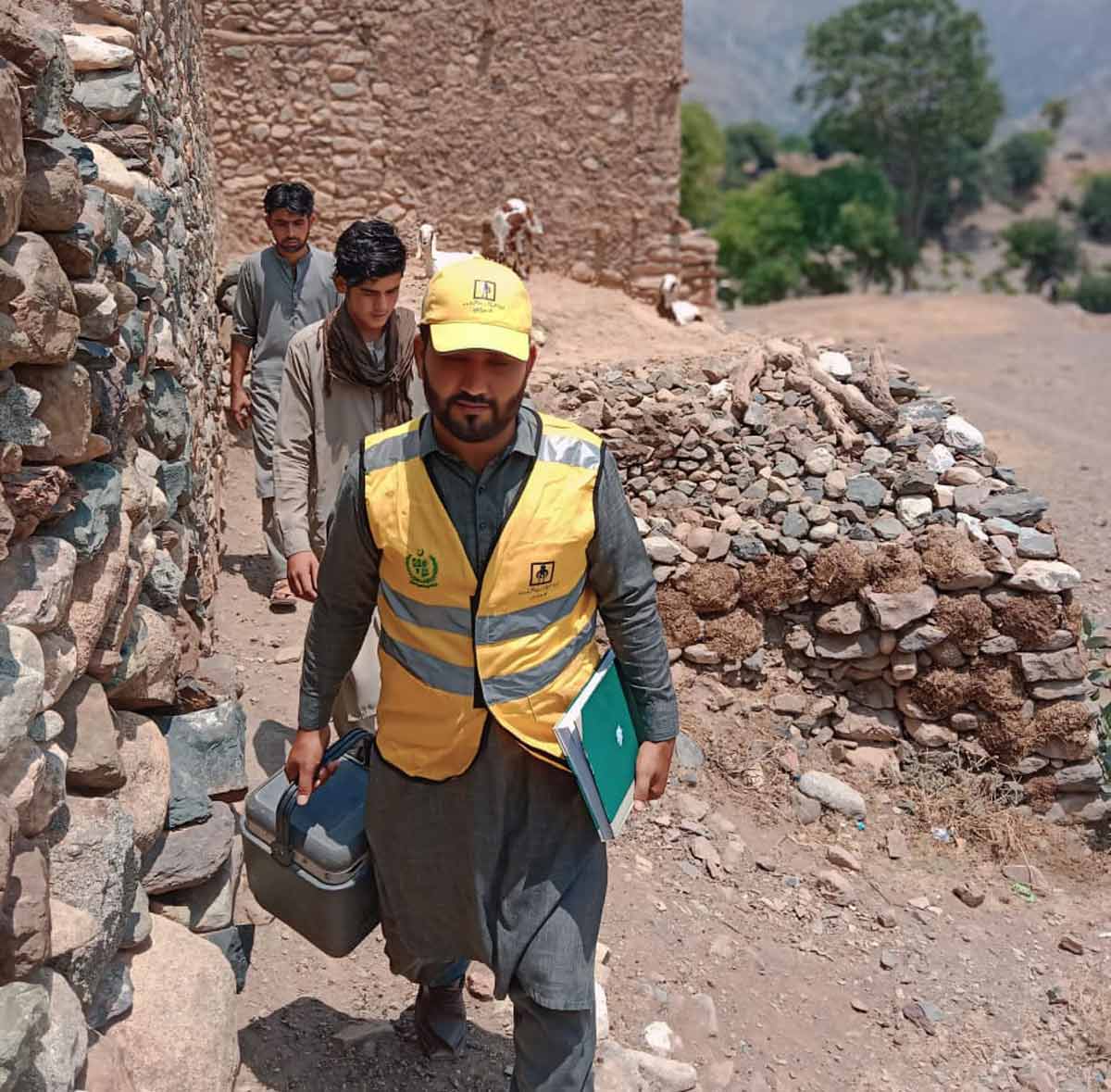
Deadly degrees
Ranked fifth in a list of the world’s most vulnerable countries to climate change by the Global Climate Risk Index, Pakistan is heating up.
The dwellers of Karachi, the country’s most populous city, have this summer experienced a deadly heatwave, causing the hospitalisation of thousands of people and reportedly killing as many as 500.
Provincial health departments are issuing advisories urging people to protect themselves from heatstroke.
But as more people use electrical equipment to get relief from the soaring heat, electricity outages increase in duration and frequency, due to a wide gap between production and demand.
And yet, the robust cold chain developed by the country’s EPI is performing effectively in guarding the vaccines from the impacts of climate change, helping to head off at least one second-order health crisis.
Powerful, but sensitive
“All vaccines are sensitive biological substances that progressively lose their potency and the loss is much faster when the vaccine is exposed to temperature outside the recommended storage range,” explained Zahid Basit, Communication Officer at EPI Pakistan.
“The role of cold chain is like a back bone in maintaining the potency of vaccine intact. Otherwise the whole exercise goes into waste, draining billions of rupees, besides endangering precious lives of large numbers of people,” Basit added.
To ensure that full vaccine potency is retained properly, storing the vaccine at the recommended temperature is vitally important, he underscored.
Shielding the shields
“Realising the severity of extreme weather events and increasing temperature, EPI is very much careful in maintaining its cold chain strong and functioning to protect vaccine efficacy from damage caused by heatwave,” said Dr Muhammad Arif, Director of Khyber Pakhthunkhwa’s EPI.
The 3,500-member provincial vaccinator corps is given special training to make sure they understand the importance of maintaining the standard temperature as vaccines are transported from metropolitan cities to stores in remote mountainous regions, Dr Arif said.
“EPI Khyber Pakhtunkhwa is providing vaccination to 1.3 million children under the age of two against 12 perilous diseases including childhood tuberculosis, poliomyelitis, diphtheria, pertussis, tetanus, hepatitis B, Haemophilus influenzae type b, pneumonia, measles, meningitis, neonatal tetanus and rubella,” he added. The stakes are clearly high.
EPI(c) mission
Since its launch in 1978, Pakistan’s EPI has been helping curtail the burden of morbidity and mortality among children and women, said Asad Zia, an official of EPI Khyber Pakhtunkhwa.
“Vaccine quality, safety, transportation, cold chain, storage, surveillance of vaccine preventable diseases, data analysis, research and new vaccines are key areas that the programme looks after,” he said. “The programme has a ubiquitous presence all the way from provincial, to district, tehsil to union council level,” he added.
“The cold chain system started operation in late seventies through installation of off-grid refrigerators including absorption refrigerators powered by the burning of kerosene oil,” said an official from technical section of EPI Pakistan, asking to remain anonymous.
Later, technologies improved, as new inventions came on the market, and new protocols were handed down from the World Health Organization (WHO), he added.
Off -grid refrigerators were replaced with electric compressor driven refrigerators, ice-lined refrigerators, solar-battery powered systems. Passive cooling devices, including cold boxes and standard vaccine carriers, improved.
A key addition, the technician said, were the electronic temperature recording devices that are installed in cold storage. These gives full details of any temperature fluctuations during the last 30 days – and issue a warning when temperatures rise. Colour-changing monitoring stickers also mark each individual vial, offering guarantees of their potency.
The official said EPI Pakistan is following standard operating procedures of WHO and will continue to bring advancements online to keep the vaccine potent and safe.
Icy roads
In Khyber Pakhtunkhwa, vaccines arrive from Federal EPI in refrigerated vehicles. From those vehicles, vaccines are shifted into cold rooms, kept at between two to eight degrees Celsius, says Engr Khurram Shezad, Cold Chain Engineer.
As far as hardware goes, the cold chain system here comprises 50 cold rooms in different districts, 3,500 ice-lined refrigerators (ILRs), a pool of refrigerated trucks, and many passive vaccine carriers – all overseen by a provincial level dashboard for monitoring temperature fluctuation in different facilities.
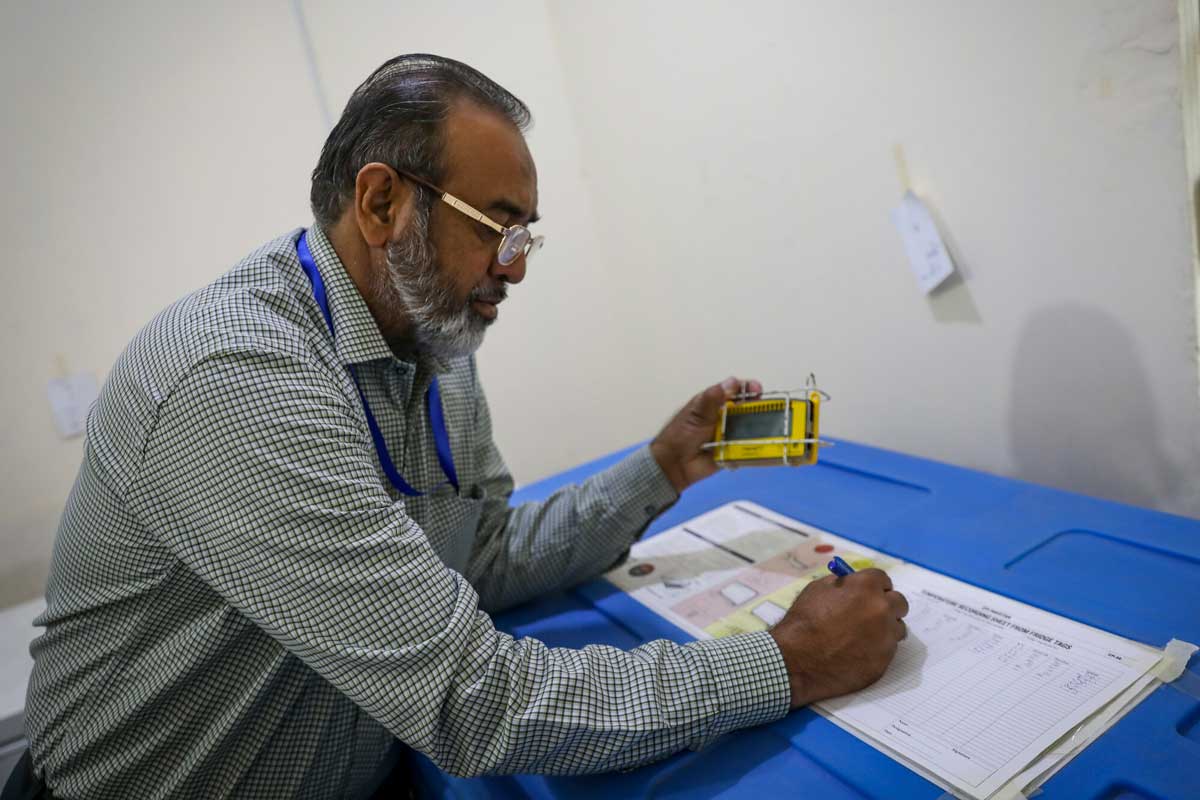
For ensuring continuity of the cooling process during summers, when electricity supply fluctuates due to load-shedding, a solar power system has been installed for more than 600 of the province’s ILRs, Engr Khurram told VaccinesWork.
The department has also installed remote temperature monitoring devices (RTMDs) in 27 districts facing frequent electricity outages, and set up a dashboard to keep a vigil on the temperature of all store rooms. The RTMDs raise the alarm in case of fluctuation in temperature, sending signals to the dashboard.
The cold chain is maintained with the same standard procedures at district level as at provincial and federal level. From the district level, vaccines are supplied to union council level in passive carriers, says Khurram Zareen, Incharge Divisional Cold Room KP.
More than 3,500 EPI vaccinators collect their vaccines from health facilities in these standardised cool boxes for administering to eligible children, Khurram Zareen elucidates.
Have you read?
Technicians on wheels
For the smooth functioning of the cold chain system, the department has also developed a chain of mobile workshops for prompt response to any call of emergency and rectification of the fault within hours, says Dr Fahim Marwat, Technical Officer with the WHO. Think of these as cold chain ambulances: vehicles carrying technicians and any equipment that might be needed to restore a key bit of equipment to function, promptly.
“We are thankful to international donors including World Health Organization (WHO), UNICEF and Gavi for providing help in shape of provision of vaccine, mobile refrigerators, mobile workshops and tablets to keep the cold chain intact and maintain the effectiveness of vaccine intact in all seasons,” said Syed Qasim Ali Shah, Health Minister Khyber Pakhtunkhwa.
The cold chain of EPI is playing a very important role in saving life of millions of children and its smooth functioning is possible through support of international donor organisations, he added.
